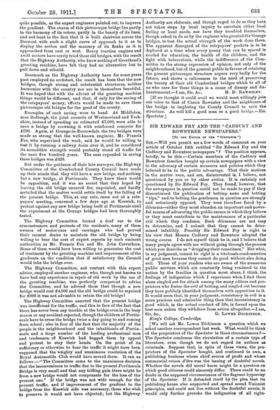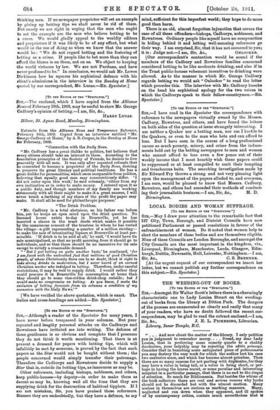SIR EDWARD FRY AND THE "CADBURY AND ROWNTREE NEWSPAPERS."
[To THE EDITOR OW THE " SPECTATOR9
SIR,--Will you permit me a few words of comment on your article of October 14th entitled "Sir Edward Fry and the Cadbury and Rowntree newspapers " P The position appears, briefly, to be this :—Certain members of the Cadbury and Rowntree families bought up certain newspapers with a view to the advocacy of certain measures and policies which they believed to be to the public advantage. That their motives in the matter were, and are, disinterested is, I believe, not questioned by you or by other critics. It is certainly not questioned by Sir Edward Fry. They found, however, that the newspapers in question could not be made to pay if they discontinued the publication of betting news and betting " tips," and to betting the gentlemen in question are strongly and notoriously opposed. They were therefore faced by a dilemma—either they must abandon an important and power- ful means of advocating the public causes in which they believe or they must contribute to the maintenance of a particular evil which they condemn. Such dilemmas are not easy to determine, and I submit that they cannot be deter- mined infallibly. Possibly Sir Edward Fry is right in his view that Messrs. Cadbury and Rowntree adopted the wrong course. I do not myself think be is, and I believe that many people agree with me without going through the process which you describe as " drugging their conscience." But what, in my judgment, cannot be right is a wholesale condemnation of good men because they cannot do good without also doing evil. Those of your readers who are aware of the numerous public services which are constantly being rendered to the nation by the families in question must share, I think, the feelings of indignation which I experience when I find them alone singled out for attack among the many editors and pro- prietors who foster the evil of betting, and singled out because they have publicly identified themselves with opposition to it. It would seem that, in your judgment, consistency in evil is more precious and admirable thing than that inconsistency in good which, in the actual conduct of life, is forced upon the best men unless they withdraw from action altogether.—I am, King's College, Cambridge.
[We will ask Mr. Lowes Dickinson a question which we asked another correspondent last week. What would he think of the proprietors of the Spectator in these circumstances P—• The Spectator condemns the circulation of a certain type of literature, even though we do not regard its authors as criminals. Suppose that, in spite of these views, the pro- prietors of the Spectator bought, and continued to own, a publishing business whose chief source of profit and whose commercial raison d'être was the issuing of doubtful novels. Whether the novels did moral harm might be a question on which good citizens could sincerely differ. There could be no doubt in the supposed circumstances of the flagrant hypocrisy of the Spectator. If it defended itself by the plea that its publishing house also supported and spread sound Unionist principles, and could not live without the doubtful novels, it would only further provoke the indignation of all right- thinking men. If no newspaper proprietor will set an example by giving up betting tips we shall never be rid of them. But surely we are right in urging that the men who ought to set the example are the men who believe betting to be a curse. We would gladly appeal to the worldly editors and proprietors if it was likely to be of any effect, but what would be the use of doing so when we know that the answer would be : " We do not regard betting and the fostering of betting as a crime. If people like to bet more than they can afford the blame is on them, not on us. We object to keeping She world virtuous by law. We are not Puritans, and have never professed to be." In conclusion, we would ask Mr. Lowes Dickinson how he squares his sophistical defence with his client's admissions in the interview in the Sunday at Home quoted by our correspondent, Mr. Lucas.—En. Spectator.]











































 Previous page
Previous page